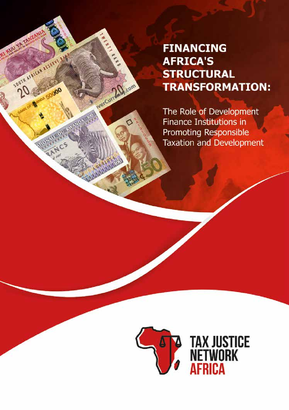FINANCING AFRICA'S STRUCTURAL TRANSDORMATION - The role of Development Finance Institutions in promoting responsible Taxation and Development

Taxation is one of the key components of domestic revenue mobilization since it is a reliable source
of revenue for governments to fund public services for their citizens. Other alternative sources of
finance such as Official Development Assistance (ODA) and Foreign Direct Investment (FDI) have been
negatively affected by the on-going global financial liquidity challenges and have increasingly become
very unreliable not to mention the conditions through which they are awarded. On this basis tax
revenue has been fronted as the key component of domestic revenue which is necessary in financing
sustainable development in the post 2015 development agenda.
Economic and social development is a long-term undertaking. Development Finance Institutions
(DFIs) while playing their role of bridging the funding gap they remain in a better position to promote
responsible taxation and development in the countries where they operate. Investors also have an
obligation to respect human rights by acting responsibly, particularly in tax matters, businesses and
investors can help improve the rule of law and thus reduce the scope for corruption. This paper
explores the dynamics of financing Africa’s structural transformation while examining the role of DFIs
as an engine of responsible taxation and development. Using purposive interviews to compliment
the literature review, it was found that DFIs play a critical role in achieving Africa’s structural
transformation. Trade mis-invoicing, tax-base erosion and profit-shifting in developing countries among
other negotiated tax incentives were found to be avenues through which resources are misdirected
away from financing for development in developing countries.
To curb these vices, DFIs should practice responsible lending by encouraging beneficiary investors to
practice responsible taxation by upholding transparency, accountability and fairness in their respective
investments.
